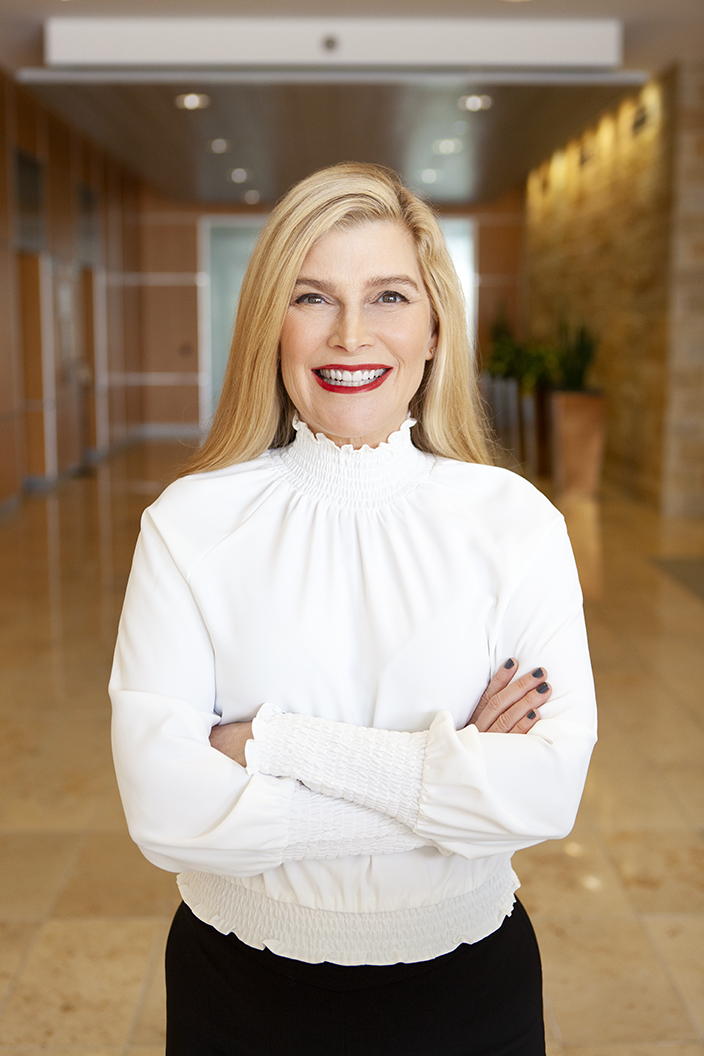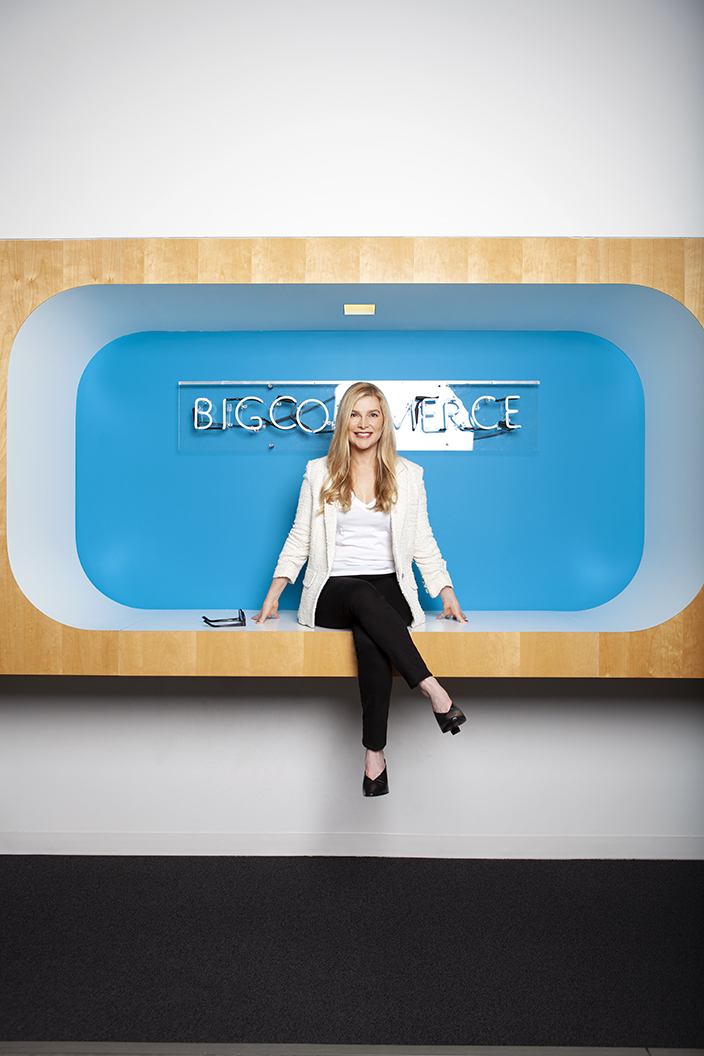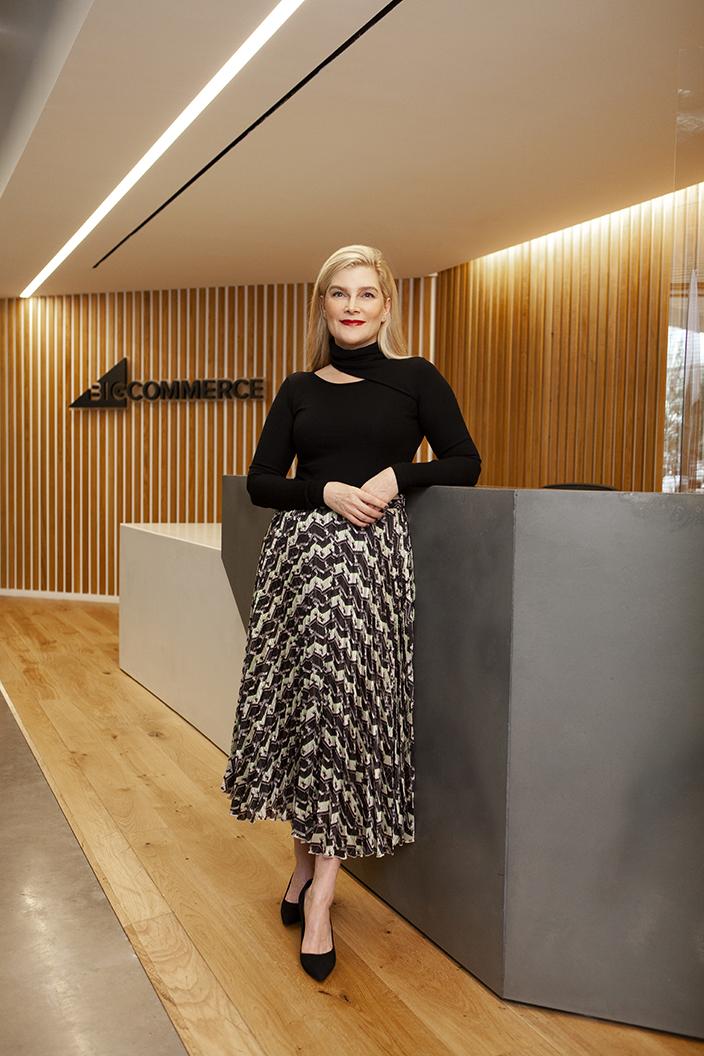BigCommerce CMO Lisa Eggerton tackles the world with wide eyes and an open mind.
By Hannah J. Phillips, Photos by Rudy Arocha, Shot on location at BigCommerce
Lisa Eggerton knows how to tell a good story. Born in New Orleans, a city steeped in narrative, the arc of her decades-long career unfolds as more of a novel with colorful plot twists than the bio of a C-suite executive who has helped take not one, but two Austin tech companies public in the last nine years. While a love of storytelling rarely appears in the job description for leaders in the tech industry, Eggerton considers it one of the driving forces of her career.

An early love of reading instilled the curiosity and open mindedness that would become Eggerton’s calling card. First, in the advertising world of New York and San Francisco, and now, in Austin’s booming tech community. Growing up as an only child, Eggerton recalls relying on reading for companionship, escape and a source of joy. A favorite was Harriet the Spy, whose titular hero always carries a marble-covered composition book to jot down her observations on life as an 11-year-old.
“I think I still have Harriet the Spy moments,” says Eggerton. “She’s not a role model, per se, since she’s not always a likeable character. But I gravitated toward her love of observing other people. It’s such a great book about being curious.”
Curiosity & Lisa Eggerton in NYC
Eggerton’s own curiosity eventually led her to live in the same location as the book’s setting, New York City. After earning a literature degree from Tulane University, she left her hometown with a college friend on the Amtrak Crescent. A 30-hour train ride from the Big Easy to the Big Apple. Arriving in New York City with a suitcase and duffle bag, Eggerton waited tables before finding her first job as a production assistant with a group called Festival Productions. The jazz festivals evoked her New Orleans nostalgia, but the role was seasonal; August found her searching for freelance work until festival season resumed in the spring. When the owner of Festival Productions mentioned a junior position in the company’s marketing division, Eggerton decided to accept. At least until April, anyway.
“I wasn’t particularly interested in corporate marketing at the time, but I decided to give it a try,” says Eggerton. “It ended up being an extraordinary job. American Express was their main client, and I learned so much. I shifted into that role and never went back.”
The shift was more natural than it might render on paper. Eggerton went from assisting the talent at large music festivals to helping American Express roll out new programs for its platinum-level card holders. Nearly every contemporary credit card company offers some form of membership feature today. However, AmEx was revolutionary in its late-’90s rollout of premium perks.
Good Timing
“I got to do things that no other young woman living in a seventh-floor walkup in New York would ever get to do,” Eggerton recalls. “We produced Julia Child’s 80th birthday party. The highest level cardholders could have lunch with her and celebrate her birthday. On the one hand, I was sharing a can of Goya beans at night with two roommates; by day, I’m at the Four Seasons with Julia Child.”
Eggerton revisits that juxtaposition with palpable gratitude. Some opportunities just come down to perfect timing.
“I hate when women attribute success to luck. It can do such a disservice to drive and hard work,” she says. “I typically don’t do that. But in this case, it was just pure luck that the clock ran out on the jazz festival job because I would have capped out.”
Moving on to San Francisco
Instead, Eggerton established herself in the marketing world. Working in New York for almost a decade before relocating to San Francisco. Like her first job at Festival Productions, the Bay Area move was not an opportunity she actively pursued. But it sparked her curiosity and presented a new career storyline. In New York, she had become one of the only women on a leadership team in a recently acquired company, Euro RSCG (now Havas Creative). As the company expanded to California, she recalls chatting with her CEO about why the new offices in Los Angeles and San Francisco weren’t coming together as they should.
“I remember him telling me, ‘I’m not interested in admiring problems; I’m interested in solving them,’” says Eggerton. “He said, ‘If you have a better way, move there and go fix it.’”
So she did.
Within the month, Eggerton left her apartment, friends and New York network. Moving to California as general manager of the company’s West Coast division. Looking back, she imagines the move may seem impulsive at first glance. But she submits that decisions can have short timelines without springing from whim. If anything, Eggerton’s signature curiosity, sifted like a diamond through high-pressure environments, has crystallized over time into a robust set of criteria for approaching each new career choice with confidence.
Exciting & Energizing
“I always ask if something will propel me forward in a way that’s exciting and gratifying. Something that puts me on a new trajectory,” she says. “I don’t operate with a five-year plan or destination in mind. Instead, I evaluate opportunities based on whether the space has enormous potential; whether I will be good at it and bring value to the role; whether it will be challenging and teach me something new and whether it will excite and energize me because I am able to have an impact.”
Applying those filters, Eggerton often knows early in the process if it’s a yes or no. She has also made a point throughout her career to consult various mentors along the way. Stressing the importance of bringing in as many unique perspectives as possible, she finds value in striking a gendered balance when exploring new ventures. Of course, as the only woman on male-dominated leadership teams in the early years of her career, seeking a male perspective was often a more practical than personal choice.
Communication is Key

“For me, it was partially a necessity to translate some of my ideas in a way that was more consumable by my peer set,” Eggerton says. “The world isn’t going to adapt to my communication style. So I’ve had great male mentors who act as a proxy for my audience.”
Even as the workforce evolved over the last two decades, she consistently invited a variety of opinions when coming to a new crossroads.
“I often see female leaders only seeking advice from other female leaders,” she says. “And while I never want to discount the value of that, it can become one-dimensional. There are plenty of things I’ve explored with male mentors, colleagues and friends. I value their viewpoint on impact, blind spots and development areas.”
BigCommerce & Big Ideas
Today, Eggerton is in a career stage where she more often seeks advice from peers than mentors. But she still prioritizes the value of different perspectives and applies the same criteria. She moved into her current position as chief marketing officer (CMO) at BigCommerce by asking the same questions she always has. After leaving her last position as CEO of Umbel, Eggerton intended to take a year off and focus on personal projects. When the BigCommerce opportunity came up, she knew almost immediately that the position ticked all the right boxes.
“I knew that eCommerce is an industry that was poised to grow dramatically,” says Eggerton. “I looked at the market conditions and saw that the company could be a flyer. Looked at the leadership team and recognized that they had the experience necessary to take this high-growth company to a great outcome.”
Ultimately, Eggerton also saw that it would be a win for Austin. Which became a new criteria after moving here in 2010. Drawn by the city’s bootstrapping spirit of innovation, she worked on strategic growth initiatives at Dell before becoming CMO at Bazaarvoice. There, she was part of the leadership team that took the company public in 2012. Which not only set the precedent for her later position as CEO at Umbel, but also for taking BigCommerce public in August of last year.
A New & Inclusive Environment
“Austin has been generous to me,” says Eggerton. “Being part of a company and taking it public, I saw what that did for employees going on to start their own company, or buy a house, or do something bigger. At BigCommerce, I wanted another win for Austin. And I wanted to work for a company where there was care for having an inclusive environment. There’s no opportunity so compelling I would take it if it wasn’t.”
BigCommerce met Eggerton’s criteria both practically and personally. Where market conditions and potential for impact were practical considerations, inclusivity was—and remains—deeply personal. Apart from her own experience as the only woman on a leadership team, Eggerton says her definition of inclusivity has expanded in recent years. She has a transgender child transitioning from female to male.
“Those teens have the highest suicide rate of any cohort. A component of that is that they don’t feel seen for who they are,” says Eggerton. “I take that as a life-or-death matter now, not a discretionary issue. Going through this with my kid has shifted my lens to make me think more expansively about what it means to have welcoming environments where you can be your most authentic self.”
From her own experience, Eggerton believes it’s not a choice to care about inclusivity when you have only worked in an environment with a 50/50 leadership team, or even 60/40.
“I see what it’s like when you are one of the few or the only person in a room. And that needs to change,” she says. “I have a strong sense of self, so I can hold my ground in environments when it’s not there. But the fatigue of it adds up.”
The Accumulation of the Little Things
For Eggerton, examples of discrimination span a spectrum. From the overt disrespect of prospective investors addressing questions to her male CFO, to smaller patterns of gender bias like being the automatic point person for administrative questions on business trips with male colleagues. In the past, when she first noticed her former colleagues—well-meaning male peers—leaned on her to coordinate meetings and dinners, she gently pushed back.
“I just stopped answering,” says Eggerton. “For months, I just said I didn’t know when dinner was or where we were meeting until one of them finally realized and they all caught on. I am not here to coordinate with you; I am your peer and no more well-equipped to manage the specifics. Those are the little things—and these are guys I love who are compassionate, ethical people and allies. But the accumulation of little things can create an environment where you have to fight for your seat at the table.”
Besides their cumulative effect, Eggerton argues that these unintended slights can actually be more painful and difficult to face directly. Getting in the ring is one thing, she says. But the innate instances of discrimination are both more disappointing and exhausting.
“And we wonder why women tap out!” she says. “Part of it is they don’t see themselves reflected the way they want.”
It’s a Joint Effort
Tackling the issue has to be a joint effort. While men have to be receptive to both overt and subtle experiences, women have to get comfortable sharing those examples as they would any other feedback. In depersonalized, approachable ways. Eggerton encourages women to sit in that discomfort. Even when it means literally sitting on your hand instead of raising it to volunteer for additional responsibilities. Flipping the myth that women need to show commitment in order to get ahead, Eggerton has seen how overstretching yourself can actually distract your attention from creating the highest value in your career.
Ironically, she learned this particular lesson after volunteering to be the executive sponsor for a diversity group at a previous company. Managing speaker programs, setting up diversity surveys and creating employee resource groups, Eggerton realized the role was not only draining her but detracting from her ability to perform to her highest potential as an executive. She recognized that she was already representing diversity and inclusion. Further, the initiative would actually have a greater impact not coming from her.
“I realized what a terrible message it sends that the woman in charge is responsible for fixing the women problem,” she says. “I had to go back to my CEO and say, ‘I know I took this on. But I also have some very aggressive targets to reach, and this should be more equitably distributed among the team.’”

When the CEO not only agreed but got personally involved in the program, the change happened much faster than it might have otherwise. The resulting message had a far greater impact on company culture.
“Together, we were able to fix that. And it was much more powerful not being led by a woman,” says Eggerton. “In the end, it sent a much stronger signal that it’s not women worried about women, but a company committed to an inclusive workplace.”
The Truth-Teller
Apart from producing much quicker cross-functional results, Eggerton notes that the shift recused her from a burden that wasn’t hers. This in turn freed her to advance in her own role. After all, isn’t that the point of such initiatives? The collaborative problem-solving—her desire to call in, rather than call out—showcases Eggerton’s trademark ability to see both the forest and the trees, to trace the overarching story in each unfolding subplot. To a degree, that ability to see potential stumbling blocks as opportunities is just the sign of a good marketer, whether optimizing internal systems, identifying new target consumers and sales tactics or finding new gaps in the market and creating new features to meet them. On the other hand, this discernment comes full circle with Eggerton’s natural curiosity and love of storytelling. Ultimately, that’s where she’s comfortable calling herself a troublemaker.
“I feel particularly comfortable being a truth-teller; I’m unafraid and unapologetic about tackling a difficult challenge,” she says. “I’m not out here creating a disruptive way to invent a spleen. But I’m changing the world in my own ways by making it more inclusive, being curious and pushing forward.”

